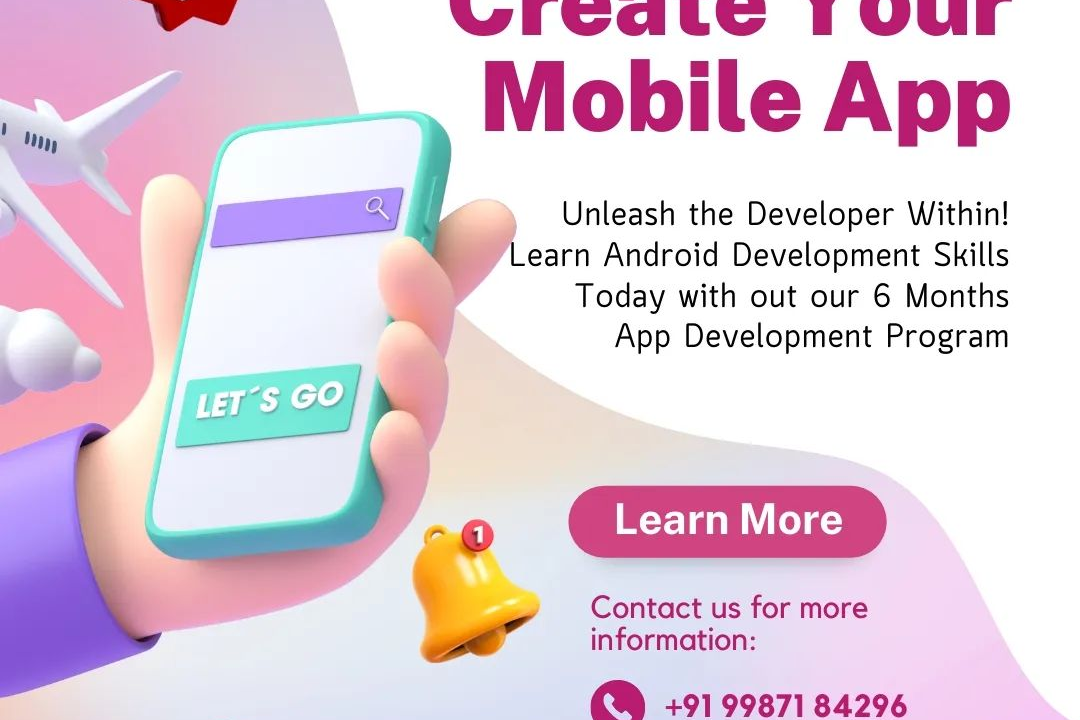Which Programming Language Is Used To Develop Android Apps
Android apps are developed primarily using Java, an object-oriented programming language, or Kotlin,
Which Programming Language Is Used To Develop Android Apps
Java is the primary programming language used to develop Android apps. It is a versatile, object-oriented language that allows developers to create robust, efficient, and user-friendly native apps. Java's extensive library ecosystem and integration with Android Studio, the official development environment for Android, make it an ideal choice for building high-quality Android applications.
To Download Our Brochure: https://www.justacademy.co/download-brochure-for-free
Message us for more information: +91 9987184296
Java is the primary programming language used to develop Android apps. It is a versatile, object oriented language that allows developers to create robust, efficient, and user friendly native apps. Java's extensive library ecosystem and integration with Android Studio, the official development environment for Android, make it an ideal choice for building high quality Android applications.
Course Overview
This course provides an overview of the programming languages used to develop Android applications. It covers the basics of Java, Kotlin, and C++ and how they are used in Android development. The course also discusses the pros and cons of each language and provides guidance on choosing the right language for your project.
Course Description
This course introduces the various programming languages used in Android app development, covering Java, Kotlin, and XML. It provides an overview of the Android ecosystem, discussing the Android SDK, app architecture, and testing. Key concepts like layouts, intents, and data persistence are explored, offering a comprehensive understanding of the process of developing Android applications.
Key Features
1 - Comprehensive Tool Coverage: Provides hands-on training with a range of industry-standard testing tools, including Selenium, JIRA, LoadRunner, and TestRail.
2) Practical Exercises: Features real-world exercises and case studies to apply tools in various testing scenarios.
3) Interactive Learning: Includes interactive sessions with industry experts for personalized feedback and guidance.
4) Detailed Tutorials: Offers extensive tutorials and documentation on tool functionalities and best practices.
5) Advanced Techniques: Covers both fundamental and advanced techniques for using testing tools effectively.
6) Data Visualization: Integrates tools for visualizing test metrics and results, enhancing data interpretation and decision-making.
7) Tool Integration: Teaches how to integrate testing tools into the software development lifecycle for streamlined workflows.
8) Project-Based Learning: Focuses on project-based learning to build practical skills and create a portfolio of completed tasks.
9) Career Support: Provides resources and support for applying learned skills to real-world job scenarios, including resume building and interview preparation.
10) Up-to-Date Content: Ensures that course materials reflect the latest industry standards and tool updates.
Benefits of taking our course
Functional Tools
1 - Android Studio: An official IDE (Integrated Development Environment) from Google, specifically designed for Android app development. It offers robust features for building, testing, and debugging apps.
2) Java/Kotlin: Java is the primary programming language used for Android app development, while Kotlin is a modern alternative introduced by Google. Both languages provide powerful object oriented programming capabilities.
3) XML (Extensible Markup Language): Used for creating and defining the user interface elements and layouts of Android apps. It provides a flexible and efficient way to design app screens.
4) Gradle: A build and automation tool used in Android app development. It allows developers to automate tasks such as dependency management, code compilation, and packaging for distribution.
5) Android Debug Bridge (ADB): A tool for communicating with and debugging Android devices. It enables developers to perform various actions, such as installing apps, running commands, and capturing screen recordings.
6) Emulator/Simulator: Software tools that allow developers to test and debug Android apps without the need for a physical device. They provide a virtual environment that mimics the behavior of an Android device.
- Answer questions accurately and thoroughly. Points are awarded for correct answers, and the more detailed your answers, the more points you'll earn.
- Participate in discussions.* Ask questions, share your thoughts, and engage with other users. The more you participate, the more points you'll earn.
- Upvote other users' answers.* When you see a good answer, upvote it to show your appreciation. Upvoting helps other users get noticed, and it can also earn you points.
- Earn badges.* Badges are awarded for completing certain tasks, such as answering questions, participating in discussions, and upvoting other users' answers. Badges can help you earn more points, and they can also show other users that you're an expert in your field.
- Refer your friends.* When you refer your friends to [Website name], they'll get a bonus when they sign up. You'll also earn points for each friend you refer.
- Answer questions thoroughly and accurately.* The more complete and correct your answers are, the more points you'll earn.
- Be the first to answer questions.* You'll earn bonus points for being the first person to answer a question correctly.
- Up vote good answers.* When you see a good answer, up vote it. This will help it get more visibility and earn the author more points.
- Down vote bad answers.* If you see an answer that is incorrect or unhelpful, down vote it. This will help it get hidden and prevent it from earning points.
- Ask questions.* Asking good questions can help you earn points, too. When you ask a question, you're giving other users a chance to earn points by answering it.
- Participate in discussions.* Joining in on discussions can help you earn points, too. When you comment on a question or answer, you're adding to the conversation and helping to make it more valuable.
- Be active.* The more active you are on the site, the more points you'll earn. So keep answering questions, asking questions, and participating in discussions.
Browse our course links : https://www.justacademy.co/all-courses
To Join our FREE DEMO Session:
This information is sourced from JustAcademy
Contact Info:
Roshan Chaturvedi
Message us on Whatsapp: +91 9987184296
Email id: info@justacademy.co










